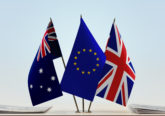The vote to leave the EU was an outcome which surprised most commentators, bookies, and even those who voted for the winning side. In the aftermath of the result, John Gray, a popular political theorist, wrote that ‘voters inflicted the biggest shock on the establishment since Churchill was ousted in 1945’. It is hard to think that he is wrong. The only social classes which predominately voted Remain were ABs (affluent and middle-class voters), whereas C1 C2 DE (lower middle-class and working-class) voters all delivered majorities for Leave.
As I predicted on this blog in January and contrary to many commentators’ expectations, the referendum engaged more voters than recent general elections. It generated the highest turnout in a UK election in a quarter of a century. Turnout in the referendum was nearly the same as turnout in the 1945 general election and higher than in several other post-war elections.
Liberal commentators, including some on this blog, have reacted with puzzlement and apoplexy. It is not we who are wrong: it’s the ignorant people in the rest of the country who are. Don’t they understand that this country will not grow as much outside of the EU? They must have been duped!
Nearly as soon as the referendum result was declared, Remain supporters began to call for a new referendum. But as Chris Hanretty, an academic at the University of East Anglia, has pointed out, the petition for a second referendum is dominated by voters from areas which voted Remain. Correlation between the estimated Remain vote in a constituency and the proportion of petitioners from such constituencies is extremely high (r=0.93).
Soon, it was concluded that voters had made the wrong decision ‘based on lies’. Commentators have focused on the ‘£350 million per week’ message delivered by Vote Leave, as evidence that the referendum was held under false pretences. Such a view implicitly assumes that people did not have their own reasons – independent of the £350 million claim – for voting Leave, or that they were not clever enough to understand it was a claim about what was possible outside the EU, not a general election manifesto commitment.
Videos of voters saying they regretted their decision were shared on the Facebook walls and retweeted on the Twitter feeds of pro-Remain friends. But as Adam Taylor has pointed out in the Washington Post, there is no statistical data to support the assertion of widespread ‘Brexit buyers’ remorse’.
Let’s look at the numbers. Exactly 1,269,501 more people voted Leave than Remain. Survation’s post-referendum poll found that 7.1 percent of Leave voters regret their choice, which equates to 1,236,162 people. Even if every regretful Leave voter changed his or her vote to Remain, it would not be enough to overturn the result. What’s more, the Survation poll also found that 4.4 percent of Remain voters (710,214 people) wished they’d voted Leave. If they switched their votes too, there would be a majority of over half a million voters in favour of Leave. Closer, but not evidence of extensive changes in attitude.
The reaction of those pushing for a second referendum is reminiscent of Bertolt Brecht’s quip, ‘Would it not be easier in that case for the government to dissolve the people and elect another?’
Rob Ford, professor of political science at Manchester, captured the reversal of fortunes which the referendum wrought: ‘Feeling upset by wrenching social change imposed by people whose values you don’t share or understand? Now you know how UKIP voters have felt’. Given that Leave voters are already less distrustful of MPs, it would be catastrophic for trust in democracy if MPs ignored the referendum outcome.
What Remain campaign fundamentally failed to understand was a central insight which Nigel Farage articulated before the European Parliamentary Elections in 2014. Many people in Britain were willing to accept a smaller Gross Domestic Product if the payoff entailed greater control over their own national decisions. Simply repeating the facts that migration is overall a net positive for the economy, that on average immigrants pay more into the welfare state than they take out, or that Britain receives investment from the EU would have little effect. While accurate, such economistic arguments lack resonance.
For many voters, this was a much more fundamental choice about democratic accountability and responsive institutions. ‘Take back control’ was an extremely powerful slogan because it, in part, reflected a public desire for the British state to react to globalisation on its own terms and in a way which is responsive to the electorate. It was a desire for the UK Parliament to have the final say over Britain’s fiscal and economic future, Britain’s policies on immigration, and control over business practices in this country.
David Miller, a political theorist here at Oxford, has written powerfully on this impulse in his recent book on immigration. Voters are not necessarily anti-immigration, but citizens do expect to have a say about who is and is not included in their national community. When it came to the expansion of the EU in 2004 and the subsequent labour flows which resulted, there was little effort from the New Labour government to consult on the policy. There were five sentences on immigration in Labour’s 2001 manifesto. None mentioned EU expansion or the costs of immigration. Yet, EU expansion has resulted in what the political scientist Geoff Evans describes as levels of immigration which are by historical British standards ‘exceptionally high’. It is no surprise, therefore, that it was only after 2004 that people’s views on the European Union and their concerns about the levels of immigration in Britain became closely aligned.
‘Taking back control’ is not the end of the story, but the beginning. This was not a general election. There are no manifestos to be implemented. Those manifestos are now to be written. As I have outlined elsewhere, for the British Left, Brexit opens a wealth of new policy opportunities which were curtailed while we remained in the European Union.
It is now the responsibility of the two main parties to look forward from this result and offer their vision of what Britain will look like outside the European Union.



